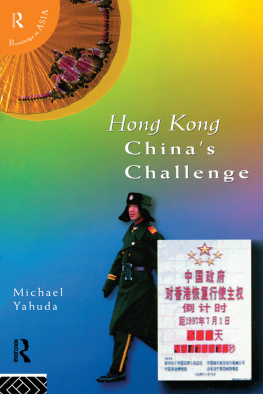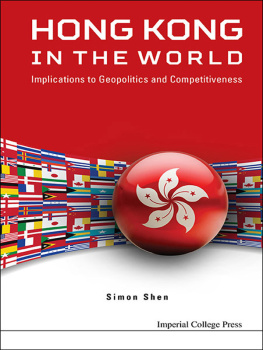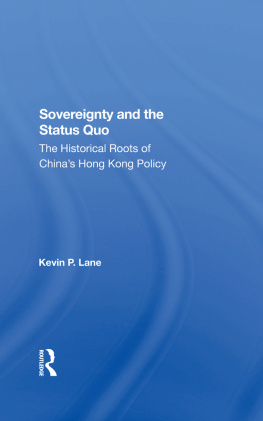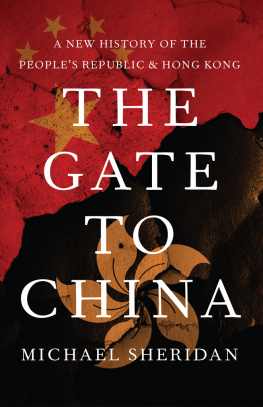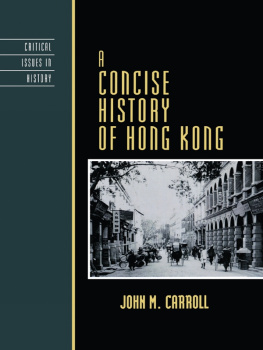Hong Kong
The return of Hong Kong in 1997 could bring China countless political and economic benefits bolstering both its already rapidly expanding economy and its international standing. The potential gains are undeniable, but there are no guarantees that China will harness the colonys full potential. Crucially, it is Chinas handling of the transition that will decide whether an opportunity is seized or missed.
This study explores the challenges that Chinese policy makers face up to 1997 and beyond: the clash of political cultures; handling problematic negotiations; and dealing with conflicting economic interests. Michael Yahuda assesses the Chinese motives and agendas that inform both Sino-British negotiations and relations between the communist authorities and the inhabitants of Hong Kong.
This is a valuable contribution to the debate about the future of Hong Kong under Chinese rule which recognises that it is essential for China to adopt a laissez-faire approach to the colony and its lucrative markets. Failure to do so will have serious consequences for the future of China itself.
Michael Yahuda is Reader in International Relations at the London School of Economics and Political Science, University of London.
Hong Kong
Chinas challenge
Michael Yahuda
First published 1996
by Routledge
11 New Fetter Lane, London EC4P 4EE
Simultaneously published in the USA and Canada
by Routledge
29 West 35th Street, New York, NY 10001
Reprinted 1996
1996 Michael Yahuda
Typeset in Times by Routledge
Printed and bound in Great Britain by
TJ Press (Padstow) Ltd, Padstow, Cornwall
All rights reserved. No part of this book may be reprinted or reproduced or utilized in any form or by any electronic, mechanical, or other means, now known or hereafter invented, including photocopying and recording, or in any information storage or retrieval system, without permission in writing from the publishers.
British Library Cataloguing in Publication Data
A catalogue record for this book is available from the British Library
Library of Congress Cataloguing in Publication Data
Yahuda, Michael B.
Hong Kong: Chinas challenge/Michael Yahuda.
p. cm. (Routledge in Asia)
1. Hong Kong Politics and government. 2. China Politics and government
1976- I. Title. II. Series.
DS796.H757Y34 1996
ISBN 0-415-14070-6 (hbk)
ISBN 0-415-14071-4 (pbk)
For Tamar, Daniella and Davis
The constitutional status of Hong Kong was clarified in 1984 through an Anglo-Chinese treaty whereby the government in Beijing would assume sovereignty on 1 July 1997. That treaty also made provision for the political future of the territory which was to become a Special Administrative Region of the Peoples Republic with a high degree of autonomy. The initial, if guarded, optimism which greeted the Anglo-Chinese accord has given way in the intervening years to a growing apprehension about how the government in Beijing will interpret and apply its terms. The critical precipitating factor in the adverse change in the climate of relations between the government in Beijing with those in both Hong Kong and London was the massacre of pro-democracy demonstrators in Tiananmen Square in June 1989. That bloody episode and the popular reaction within Hong Kong caused the Chinese government to view the territory as a source of subversion and a threat to the established political order in the Peoples Republic. Attempts by successive Governors of Hong Kong to sustain popular confidence within the territory through promoting the construction of a new airport and to widen the bases of democratic participation were construed in Beijing as political challenges one response being a public commitment to replace Hong Kongs elected Legislative Council on the morrow of the transfer of sovereignty. The main issue, as that moment of transfer approaches, is whether China will honour its pledge to allow Hong Kong to maintain its rule of law and basic freedoms that have been responsible for its remarkable economic success from which the Peoples Republic has greatly benefited.
Michael Yahuda takes this question beyond the important issue of the predicament facing Hong Kong and its people to that of whether or not Chinas political leaders will see the assumption of sovereignty as an opportunity to be grasped to national advantage. He has identified and addressed a dimension of the problematic future of Hong Kong that has been neglected in the literature. The future of Hong Kong, as he puts it, is a critical test for China as it sustains its commitment to economic modernisation, faces the issue of political succession and seeks to effect unification with Taiwan on its own terms. With respect to the latter, how China handles Hong Kong will be the first test of the formula of one country two systems invented with Taiwan in mind. Well beyond that, as Michael Yahuda writes, a display of tolerance for an autonomous Hong Kong would consolidate its new relations with the Chinese communities outside China, strengthen Beijings stance regarding Taiwan, reduce anxieties in Southeast Asia, ease Chinas relations with the USA, enhance the process of Chinas integration with the Asia-Pacific region, and improve Chinas international standing generally.
The great merit of this succinct and profound analysis of the challenge facing China in assuming sovereignty over Hong Kong is that it has identified a likely turning point in Chinas role and place within international society. Without disregarding the domestic problems that may be posed for Chinas leadership in fulfilling the spirit as well as the letter of the Anglo-Chinese accord, it explores a dimension of Chinas assumption of sovereignty over Hong Kong which has wide-ranging international significance in a post-Cold War world. For that reason, this book not only makes a scholarly contribution to an understanding of Chinas position and prospects in seeking to assimilate Hong Kong, but also to a central and critical issue in Chinas foreign policy at the turn of the century.
Michael Leifer
In the writing of this book I have benefited greatly from the interviews and discussions with officials, scholars, business people and journalists in Hong Kong, London, Beijing and Washington. Most of these cannot be named for obvious reasons, but it is with pleasure that I acknowledge the help and encouragement of Joseph Cheng, Simon Holberton, Brian Hook, Michael Leifer, Simon Long, Jonathan Mirsky, Gerald Segal, David Shambaugh, Wang Gungwu, Byron Weng and Dick Wilson. Needless to say, none of them (or those I have not mentioned by name) is responsible for any of the shortcomings this book may possess.
Finally, I am most grateful for the following bodies who provided me with financial assisstance: the Nuffield Foundation Small Grants to visit Beijing and Hong Kong in the summer of 1992; the British Academy to visit Beijing twice, in February and July 1995; and the International Studies Fund of my college, the London School of Economics and Political Science, that helped towards funding my almost annual visits to Hong Kong since the mid-1980s. The Woodrow Wilson Center in Washington, DC, kindly provided me with excellent facilities as a Guest Scholar in April 1995 to enquire into American perspectives on the Hong Kong question.

